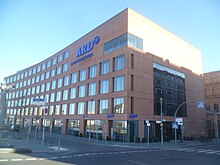
Back ARD Afrikaans ARD ALS إيه آر دي Arabic ARD AST ARD (teleşirkət) Azerbaijani ARD Bulgarian ARD Catalan ARD Czech ARD Danish ARD German
 Logo since December 2019 | |
| Type | Broadcast radio, television and online |
|---|---|
| Country | Germany |
| Availability | National International |
| Owner | Independent[1] |
Key people | Kai Gniffke (SWR), Chairman |
Launch date | 5 June 1950 |
Official website | www |

ARD[a] is a joint organisation of Germany's regional public-service broadcasters. It was founded in 1950 in West Germany to represent the common interests of the new, decentralised, post-war broadcasting services – in particular the introduction of a joint television network.
The ARD has a budget of €6.9 billion, 22,612 employees and is the largest public broadcaster network in the world.[2][3][4] The budget comes primarily from a mandatory licence fee which every household, company and public institution, regardless of television ownership, is required by law to pay. For an ordinary household the fee is €18.36 per month, as of 2023. Households living on welfare are exempt from the fee. The fees are not collected directly by the ARD, but by the Beitragsservice (formerly known as Gebühreneinzugszentrale GEZ), a common organisation by the ARD member broadcasters, the second public TV broadcaster ZDF, and Deutschlandradio.
ARD maintains and operates a national television network, called Das Erste ("The First") to differentiate it from ZDF, a.k.a. "das Zweite" ("The Second"), which started in 1963, as a separate public TV broadcaster. The ARD network began broadcasting on 31 October 1954 under the name of Deutsches Fernsehen ("German Television"), becoming Erstes Deutsches Fernsehen ("First German Television") with a corporate redesign in 1984; it adopted its current short name (Das Erste) in 1994. ARD's programmes are aired over its own terrestrial broadcast network, as well as via cable, satellite and IPTV.
ARD also produces two free-to-air channels (one and Tagesschau24) and participates in the production of Phoenix (current events, news and documentaries), KiKa (kids-oriented), 3sat (cultural-oriented), arte (Franco-German cultural programming), and Funk (teenage-oriented, online only).
ARD's programming is produced by its regional members (see also Institutions and member organizations) (Bayerischer Rundfunk (BR), Hessischer Rundfunk (HR), Mitteldeutscher Rundfunk (MDR), Norddeutscher Rundfunk (NDR), Radio Bremen, Rundfunk Berlin–Brandenburg (RBB), Saarländischer Rundfunk (SR), Südwestrundfunk (SWR) and Westdeutscher Rundfunk (WDR)), which operate 54 regional and local radio stations and seven regional TV networks, some of which have opt-outs at during the day.[clarification needed] Deutsche Welle, Germany's international broadcaster, is also a member of ARD.
- ^ "There for you. ARD" (PDF). Archived (PDF) from the original on 2021-07-16.
- ^ "ARD Finanzbericht" (PDF). ARD. 2014. Archived from the original (PDF) on 2020-06-25. Retrieved 2017-01-11.
- ^ "ARD Mitarbeiter". ARD. 2015. Archived from the original on 2017-08-01. Retrieved 2017-01-11.
- ^ Anschlag, Dieter (2022-04-05). "2. ARD". www.mediadb.eu. Institut für Medien- und Kommunikationspolitik. Retrieved 2022-05-06.
Cite error: There are <ref group=lower-alpha> tags or {{efn}} templates on this page, but the references will not show without a {{reflist|group=lower-alpha}} template or {{notelist}} template (see the help page).
© MMXXIII Rich X Search. We shall prevail. All rights reserved. Rich X Search